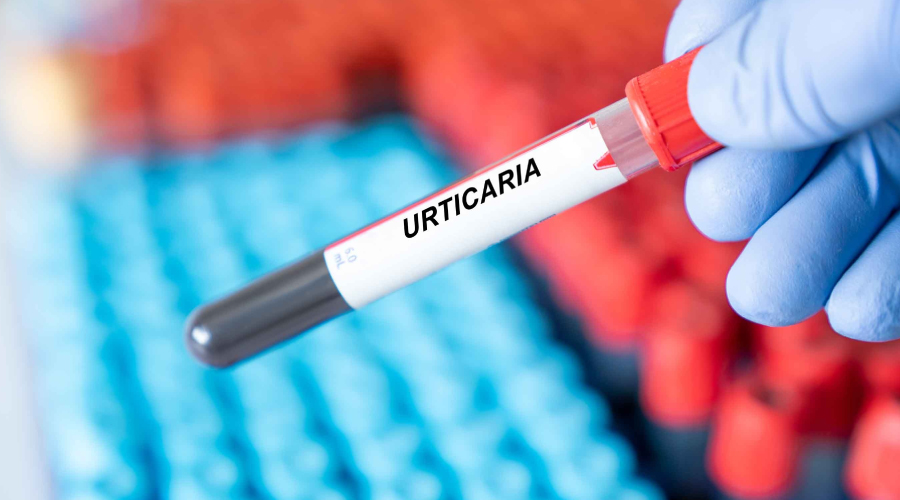

Urticaria, also known as hives, is a type of skin reaction or an allergic reaction which occurs when you are allergic to different substances such as pollen, animal dander, or insect bites. When your body is allergic to something, it tends to produce a chemical called histamine in the bloodstream. These chemicals are produced in order to guard against the infection.
Urticaria can also occur due to a physical trigger, such as pressure on the skin owing to tight clothing, extreme hot or cold weather. Hives can also develop if you have swallowed something to which you are allergic to, be it a food item (like shellfish or nuts) or specific medicine. However, not many might be knowing that urticaria can also be an indicator of an infection, stress/anxiety or some diseases. Hence, it is important to talk to your healthcare provider to know about the exact cause.
Characterised by raised, itchy welts, or bumps on the skin, urticaria usually commences as itchy patches and turns into swollen welts of variable sizes. Chronic hives are extremely uncomfortable and may prove to be a hindrance in carrying out everyday activities.
Now that we have a better understanding of hives, let’s have a look at treatment, symptoms, and remedies.
Urticaria Symptoms
It is no unknown fact that one of the major urticaria symptoms is the appearance of welts on the skin. They can be red in colour but can be of the same shade as that of your skin. Also, hives don’t have any definite shape. Hives can also change shapes and can grow in size. Itchy in nature, hive welts can also appear and disappear during the course of infection. Apart from rashes and welts, some of the other urticaria symptoms are:
- Bumps on skin that may be pink, red or skin-coloured
- Intensely itchy skin
- Some may also experience stinging or burning sensation
- Swelling under your skin or even around lips, eyes, and cheeks
- Blanching aka bumps with a pale-coloured centre as and when pressed
- Tiny spots or blotches
- Flared being triggered by external causes such as heat
Urticaria Treatment
Before starting urticaria treatment, your doctor will confirm whether you actually have hives or not through a physical check-up. He may also talk about your symptoms and ask to keep a track of your activities, what you eat or drink, your medications, etc. In most cases, your skin will show urticaria symptoms like raised itchy bumps or welts.
Your healthcare provider may also conduct a series of blood tests in order to understand the cause behind hives. A mild case of urticaria doesn’t require a prescription treatment and in order to offer relief, your doctor may suggest some antihistamines, soothing creams to decrease itching and even antiseptic creams in order to avoid any secondary infection. For mild urticaria treatment, you may also be suggested to avoid hot water as it may irritate the area. Instead, a cold water bath is recommended so as to offer relief from mild cases of hives. If there is swelling anywhere on your face, your healthcare provider may also recommend an epinephrine auto-injector.
However, in acute cases, urticaria treatment through antihistamines continues till symptoms fade away. Doctors may also recommend injectable drugs that are capable of blocking immunoglobulin E, an antibody which is produced in higher amounts when the body overreacts to allergens. Moreover, if your test results indicate any underlying disorder, your doctor will prescribe treatment accordingly.
Now, many of you might be wondering how to cure urticaria permanently? Well, there is no permanent solution of hives per se but they can be prevented by making certain lifestyle changes and following certain remedies for urticaria treatment.
Urticaria Remedies That are Worth Considering
Simple lifestyle changes and self-care tips can help in preventing hives. Your doctor may also be able to suggest changes in your diet or your routine so as to avoid any exposure to those elements which are responsible for causing hives.
We have listed some of the best urticaria remedies, which might prove to be beneficial in avoiding their reoccurrence.
- Once you know the triggers, it is best to avoid the same. The potential triggers can be anything ranging from food and medicines to latex and pet dander.
- In case of mild hives, you can ask your general physician or chemist for a non-prescription anti-itch drug. The main benefit of such drugs is that they don’t make you drowsy but may help alleviate itching. You can also ask for an anti-itch cream for soothing itching due to hives.
- Another urticaria remedy, which is easy to implement, is taking a cold shower or applying cold compress. While taking a cold shower, you may also consider mixing oatmeal powder or baking soda.
- If you have recently suffered from a hive attack, make sure to avoid woollen or tight-fitting clothes.
- While venturing outside, don’t forget to apply sunscreen as it may irritate your skin.
- Choose mild soaps and skin care products.
- Don’t take stress as it might be one of the triggers. You can also try stress-management techniques like yoga.
Conclusion
Urticaria, or hives, is a kind of rash and is usually caused by an allergic reaction, physical triggers, or due to an underlying disease. Its symptoms and line of treatment can vary depending upon the severity of this condition. Hence, it is important to consult your doctor for personalised treatment options. Also, if there are some unusual signs, like swelling in the mouth or face, dizziness, cold skin or rapid heartbeat, make sure to consult your doctor immediately as delay may prove to be life threatening.




